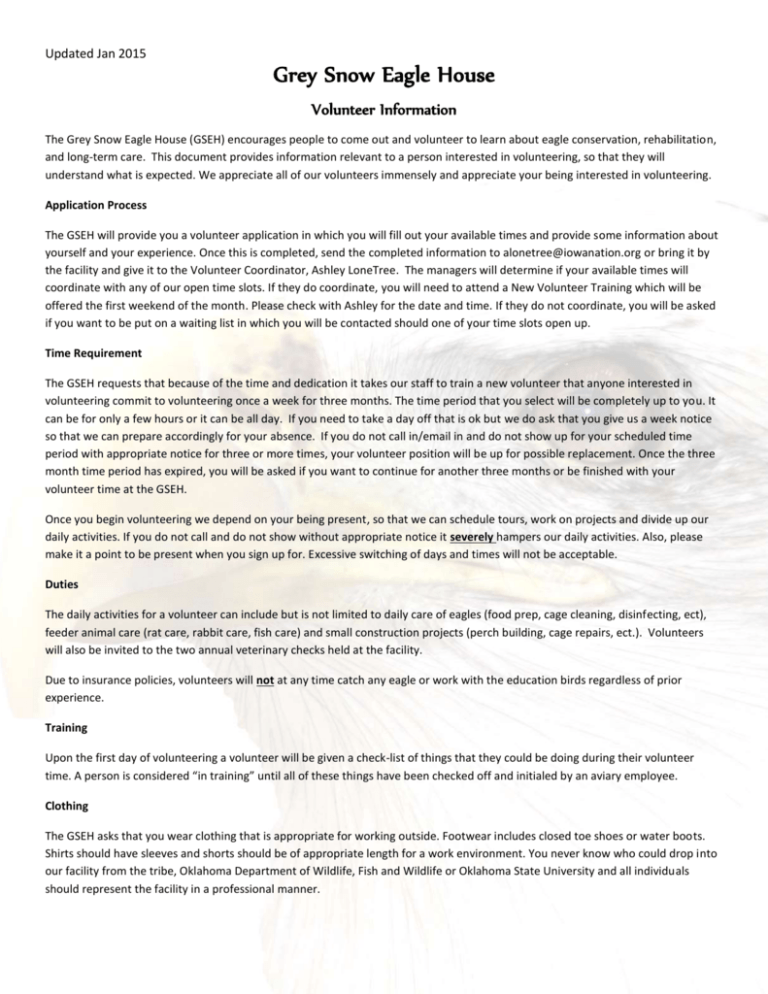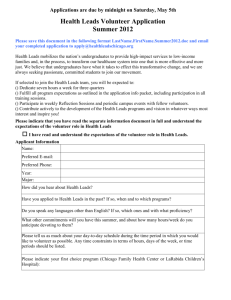Here. - Grey Snow Eagle House
advertisement

Updated Jan 2015 Grey Snow Eagle House Volunteer Information The Grey Snow Eagle House (GSEH) encourages people to come out and volunteer to learn about eagle conservation, rehabilitation, and long-term care. This document provides information relevant to a person interested in volunteering, so that they will understand what is expected. We appreciate all of our volunteers immensely and appreciate your being interested in volunteering. Application Process The GSEH will provide you a volunteer application in which you will fill out your available times and provide some information about yourself and your experience. Once this is completed, send the completed information to alonetree@iowanation.org or bring it by the facility and give it to the Volunteer Coordinator, Ashley LoneTree. The managers will determine if your available times will coordinate with any of our open time slots. If they do coordinate, you will need to attend a New Volunteer Training which will be offered the first weekend of the month. Please check with Ashley for the date and time. If they do not coordinate, you will be asked if you want to be put on a waiting list in which you will be contacted should one of your time slots open up. Time Requirement The GSEH requests that because of the time and dedication it takes our staff to train a new volunteer that anyone interested in volunteering commit to volunteering once a week for three months. The time period that you select will be completely up to you. It can be for only a few hours or it can be all day. If you need to take a day off that is ok but we do ask that you give us a week notice so that we can prepare accordingly for your absence. If you do not call in/email in and do not show up for your scheduled time period with appropriate notice for three or more times, your volunteer position will be up for possible replacement. Once the three month time period has expired, you will be asked if you want to continue for another three months or be finished with your volunteer time at the GSEH. Once you begin volunteering we depend on your being present, so that we can schedule tours, work on projects and divide up our daily activities. If you do not call and do not show without appropriate notice it severely hampers our daily activities. Also, please make it a point to be present when you sign up for. Excessive switching of days and times will not be acceptable. Duties The daily activities for a volunteer can include but is not limited to daily care of eagles (food prep, cage cleaning, disinfecting, ect), feeder animal care (rat care, rabbit care, fish care) and small construction projects (perch building, cage repairs, ect.). Volunteers will also be invited to the two annual veterinary checks held at the facility. Due to insurance policies, volunteers will not at any time catch any eagle or work with the education birds regardless of prior experience. Training Upon the first day of volunteering a volunteer will be given a check-list of things that they could be doing during their volunteer time. A person is considered “in training” until all of these things have been checked off and initialed by an aviary employee. Clothing The GSEH asks that you wear clothing that is appropriate for working outside. Footwear includes closed toe shoes or water boots. Shirts should have sleeves and shorts should be of appropriate length for a work environment. You never know who could drop into our facility from the tribe, Oklahoma Department of Wildlife, Fish and Wildlife or Oklahoma State University and all individuals should represent the facility in a professional manner. Social Media The Grey Snow Eagle House asks that you request permission to put any images from the facility and any social media website. Please email any images you would like to use to mjudkins@iowanation.org for approval. We thank you in abiding by this request as we do not want any pictures to be misunderstood by an outside party. Advancement Volunteers will advance to the next level if they are in good standing at the following times: 0-3 months-Volunteer in Training 3-12 months- Volunteer 12+ months- Senior Volunteer 0-3 months-Volunteer in Training Volunteers at this stage will shadow employees or senior volunteers while they work towards completing the volunteer check list. Once the volunteer check list is completed, they will be assigned specific tasks to be completed that will be checked on by supervisors. Volunteers in training will be invited to attend quarterly trainings to advance their knowledge of raptor rehabilitation, education techniques, and research. 3-12 months- Volunteer Volunteers at this stage are much more independent and will be assigned tasks to be completed during their assigned time. Volunteers are expected to check the schedule and manage their time efficiently to complete their assigned tasks in the proper way. Excessive calling out at this stage is very detrimental as others will have to complete the volunteer’s assigned tasks. Volunteers at this stage will be invited to quarterly trainings to advance their knowledge. Volunteers will also be able to help teach new volunteers in the New Volunteer Orientation meetings. Volunteers in good standing at this stage will also be invited to yearly vet checks of the eagles when Dr. Welch comes to the Grey Snow Eagle House. 12+ months- Senior Volunteer Volunteers at this stage will continue being assigned specific tasks for their hours at the aviary, but will have more of a leadership role in the volunteer program. They will also be able to help with onsite outreach when needed. Senior volunteers will be able to assist in teaching during quarterly trainings that they have previously attended, as well as the Volunteer Orientation Meeting. Senior volunteers will also aid in teaching new volunteers the daily activities at the aviary. Volunteers in good standing at this stage will also be invited to yearly vet checks of the eagles when Dr. Welch comes to the Grey Snow Eagle House. 2 Mice and Rat Protocol The Grey Snow Eagle House knows that fresh food is essential to an eagle’s well being. It is the goal of the GSEH to provide fresh food whenever possible to insure that the eagles get the nutrients they need. It takes careful and precise planning to successfully breed and raise quality feeder animals. This is an important part of what the GSEH does every day. General Duties for Mice and Rats Water: Check water bottles daily and replace empty ones with a clean, full one. Clean the dirty bottles with a very small amount of pine-sol and wash thoroughly. Excess soap can be harmful to the animals. Refill the clean bottles for the next day. If bottles are not cleaned daily they can become slimy and unsanitary. Check the water bottles frequently in hot temperatures to prevent dehydration in the animals. Food: Rodent block is the main source of food for the animals. Food should be available at all times and needs to be added if low. The cage lids have a food reservoir to allow easy access to the food. Fresh food can also be added to the rodent block such as fruit, vegetables, whole grain breads and crackers etc. with staff permission. Caging: The rodent cages are made of plexiglass with a metal lid. There are different sizes depending on the species needs. Mice are kept in smaller/lower cages and rats are kept in larger/taller cages. Rat cages have to have lids that latch, they can escape very easily. Larger rat cages are used for feeder groups and fully grown litters still with their mother. Smaller cages are for the breeder rats and smaller litters still with their mother. Each breeding family has their assigned shelf and each rat is given an identification tag that will follow them from cage to cage. All tags will have the rat’s gender, name, approximate age and a detailed physical description. The female tag should also have their breeding partners, dates of breeding and productivity. Cleaning Cages: Cages should be cleaned as needed. This is usually every other day depending on how many animals are in a cage. When the cage material is dirty or wet, a new cage of equal size should be prepared with a thin layer of shredded paper or pine shavings (for mice and moms with babies; add straw for nesting material for expectant mothers. For mice colonies, transfer a small amount of old bedding to new cage. Transferring from one cage to another: When the new cage is ready, transfer the lid over from the old cage leaving a small gap open for the animal to fit. Picking the animals up by the tail is the easiest and least stressful way to handle them. Try to handle the animals as little as possible to reduce stress. For mother rats, she gets moved to the new cage first, then the babies. Be careful of rats with babies, they are very territorial and may bite. Newborns are counted and tallied on the mother’s tag. Soiled cage material is tossed in the proper trash container and then the cage is scrubbed out with a small amount of pine-sol, sprayed with a bleach solution and let sit for 5 minutes. Rinse the cages well and dry thoroughly for the next use. Make sure to transfer the female’s tag to the new cage. 3 Quail House Protocol AM Put any new eggs into the refrigerator pointy side down in the egg container. Make sure the refrigerator is at 50°F. If not, notify management. Check the water level of the incubator unless there is a do not open sign on the incubator. The water pan should be approximately half full-full. Check the digital reader on the incubator the temperature should be 100°F and the humidity should be between 44-55% unless there is a do not open sign in which it should be 55-65%. If the pan was empty it will probably be lower, just refill the pan. If the pan was full and it was off more than 5% contact management. If the humidity is wrong during the do not open sign period, notify management before opening the door. Refill food and water contains for the breeders and the growers. If all that is left of the food is sand sized, throw away and refill. Only give purified water to the quail Change out the newspapers of the quail as needed. (every day-every other day should be fine) At least once a week, lift the sides of the cage and scrape the wood supports so there isn’t any fecal material build up. Sweep and mop quail area every day. If any supplies are low, write them on the white board in the office. Check food and water for the breeder and grower cages. Check water for the incubator and ensure it half full-full. Put any new eggs into the refrigerator. PM Notes: Please do not move eggs, young quail or breeders around without being told by management first. 4 Rabbit Cage Protocol AM Refill water and food containers as needed Change out the tray as needed (every day if there are a lot of rabbits, every few days for fewer rabbits). o Put a light coating of pellets on the sides, leave some room around the drain so it does not clog the drain when they expand o Spread a layer of kitty litter in the middle o Mark that it was done on the calendar on the back of the door. Sweep and mop floor every day. If low on supplies write what we need on the whiteboard in the office. Check food and water for rabbits. Refill as needed. If floor is dirty remop. PM 5 Eagle Care Protocols Eagle Cages Daily: Pick up food scraps and feathers (in separate bags) Drain pool of water Spray down EVERY PART of enclosure (including rocks, perches and walls) Clean rocks out of pool Refill pool Rake cages to prevent rocks from gathering around edges of cage Disinfect (with a member of the aviary staff only): Fill spray bottle will 1 cup bleach, then fill entire bottle with water Saturate half of cage with bleach mixture Wait at least 5 min Wash down that half cage with water Repeat with other half ICU cages: Take out mats, newspaper, and trash bags Wipe down entire cage with pinesol/paper towels then bleach wipes Lay trash bags down Lay newspaper down on top of bag Lay clean mats on top of newspaper Give fresh water Have aviary personnel transfer eagle to clean cage Place dirty mats in disinfectant Mats: Spray off matt with hose Place mat in disinfectant tub Let sit for at least 24 hours Wash down soaked mat 6 Plumes of all sizes Drawer All spikes (all sizes) Drawer All secondaries (all sizes) Drawer Contour feathers Feather trash can *Please lay wet feathers on the top of the feather cabinet to dry. **Please put dirty feathers in the appropriate place. ***All non-eagle feathers should be placed in the appropriately labeled bag in the feather drawers. If you have a question please ask! 7 Check List **Please put everything back where you got it and do not leave your trash lying around. Cages Cage Pick up Wash down Rake Disinfect Main flight Mini flight East side West side q-cage Weathering cage SE flight Rehabilitation flight Education cages Feeder Animals Task Feed and water all feeder animals Clean rat cages Clean rabbit cages Clean quail cages Date/Initial Food Preparation Task Clean rats Clean rabbits Clean fish Clean quail Field dress and prep deer (seasonal) Date/Initial Other Eagle Related Task ICU cages Mats Date/Initial Other Task Vacuum/Sweep and mop office Sanitize office with bleach wipes Assist in giving a tour Date/Initial 8 Notes 9 Grey Snow Eagle House VOLUNTEER RELEASE I hereby indicate my willingness to participate as a volunteer at the Grey Snow Eagle House. It is understood that I will follow instructions and directions given by the staff of the Grey Snow Eagle House. I agree to indemnify and hold harmless the Tribe, its officers and employees for any claims, liabilities and/or costs, including reasonable attorney’s fees and defense costs, arising of any activities related to the performance of the Agreement. In addition, I understand that volunteering does not guarantee a paid position with the aviary. While we appreciate every volunteer’s hard work, it is impossible financially to hire everyone. Therefore, accumulating 80 hours only makes you eligible for an open position; it does not guarantee a position. Name __________________________________________________________ Signature _____________________________________________________ (Signature is required of all applicants: must be 18 years of age or older) Address _____________________________________________________________________________ City_________________________________________State__________Zip______________________ Date __________/___________/___________ Phone MM/DD/YYYY In case of emergency, contact: Name_________________________________________________________________________________ Phone Day__________________________ Evening _____________________________ Cell__________________________ 10 Date In Out Duties Hours 11




